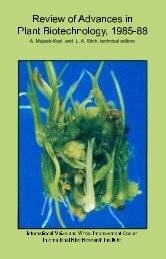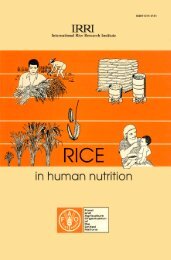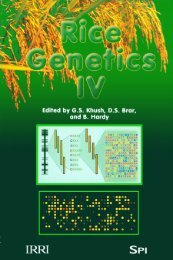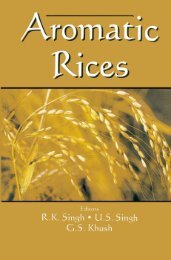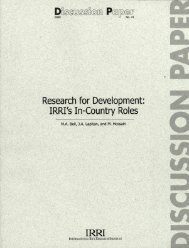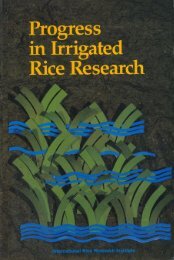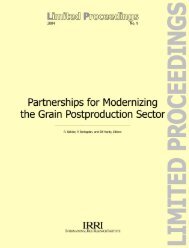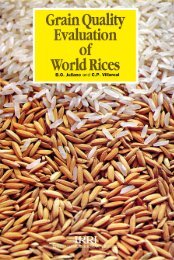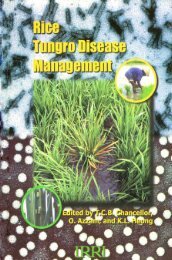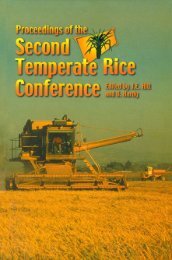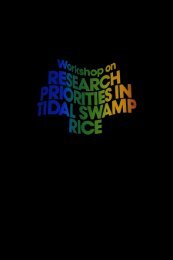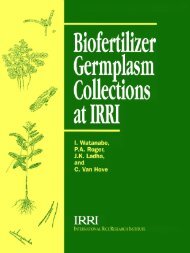- Page 3 and 4:
The International Rice Research Ins
- Page 5 and 6:
RAINFED RICE A SOURCEBOOK OF BEST P
- Page 7 and 8:
vi Foreword About 45% of the world
- Page 9:
RAINFED RICE A SOURCEBOOK OF BEST P
- Page 13 and 14:
RAINFED RICE A SOURCEBOOK OF BEST P
- Page 15 and 16:
RAINFED RICE A SOURCEBOOK OF BEST P
- Page 17 and 18:
RAINFED RICE A SOURCEBOOK OF BEST P
- Page 19 and 20:
RAINFED RICE A SOURCEBOOK OF BEST P
- Page 21 and 22:
RAINFED RICE A SOURCE BOOK OF BEST
- Page 23 and 24:
RAINFED RICE A SOURCEBOOK OF BEST P
- Page 25 and 26:
RAINFED RICE A SOURCEBOOK OF BEST P
- Page 27 and 28:
Utilisation and Management of Natur
- Page 29 and 30:
RAINFED RICE A SOURCEBOOK OF BEST P
- Page 31 and 32:
RAINFED RICE A SOURCEBOOK OF BEST P
- Page 33 and 34:
Rice Biodiversity and Genetic Wealt
- Page 35 and 36:
RAINFED RICE A SOURCEBOOK OF BEST P
- Page 37 and 38:
RAINFED RICE A SOURCEBOOK OF BEST P
- Page 39 and 40:
RAINFED RICE A SOURCEBOOK OF BEST P
- Page 41 and 42:
32 RAINFED RICE A SOURCEBOOK OF BES
- Page 43 and 44:
RAINFED RICE A SOURCEBOOK OF BEST P
- Page 45 and 46:
Socio-Economic Constraints in Rice
- Page 47:
RAINFED RICE A SOURCEBOOK OF BEST P
- Page 51 and 52:
RAINFED RICE A SOURCEBOOK OF BEST P
- Page 53 and 54:
RAINFED RICE A SOURCEBOOK OF BEST P
- Page 55 and 56:
Developing Sustainable Technologies
- Page 57 and 58:
RAINFED RICE A SOURCEBOOK OF BEST P
- Page 62 and 63:
Agro-Ecosystem Analysis for Rainfed
- Page 64 and 65:
Agro-Ecosystem Analysis for Rainfed
- Page 66 and 67:
Agro-ecosystem analysis Agro-ecosys
- Page 68 and 69:
GIS in extrapolation of location-sp
- Page 70 and 71:
Rice-growing sub-ecosystems in Sult
- Page 72 and 73:
Influence of Agro-Ecosystem Compone
- Page 76 and 77:
Principles for Improving and Stabil
- Page 78 and 79:
Water management Adopt efficient wa
- Page 80 and 81:
Major Cropping Systems and Their Ma
- Page 82 and 83:
Major Cropping Systems and Their Ma
- Page 84 and 85:
etter in the broadcast and row-seed
- Page 86 and 87:
Comparative Analysis of Different C
- Page 88 and 89:
Comparative Analysis of Different C
- Page 90 and 91:
Flood-prone areas Flood-prone areas
- Page 92 and 93:
Boro Rice Cultivation B oro rice cu
- Page 94 and 95:
Integration of Boro with DWR When t
- Page 96 and 97:
Management of Rice in Flood-Prone A
- Page 98 and 99:
Transplant 35-45-day-old seedlings
- Page 100 and 101:
Delayed transplanting Seedbed prepa
- Page 102 and 103:
Preparing a site Field dikes 1. Pre
- Page 104 and 105:
5. Put the feed in hanging trays in
- Page 108 and 109:
Crop Establishment Practices in Rai
- Page 110 and 111:
11. For medium-duration varieties,
- Page 112 and 113:
Crop Establishment Practices in Rai
- Page 114 and 115:
Comparative Analysis of Direct Sowi
- Page 116 and 117:
Machine transplanting Manual and se
- Page 118 and 119:
Direct sowing vs transplanting: a c
- Page 120 and 121:
The beushening process Beushening S
- Page 122 and 123:
Less cash inputs required Besides n
- Page 124 and 125:
Tillage Practices and Implements fo
- Page 126 and 127:
Tillage implements Function Bullock
- Page 130 and 131:
Improving the Yields of Traditional
- Page 132 and 133:
Threats to the erosion of tradition
- Page 134 and 135:
Farmers’ Participatory Plant Bree
- Page 136 and 137:
Farmers' Participatory Plant Breedi
- Page 138 and 139:
Farmers’ Participatory Plant Bree
- Page 140 and 141:
Identification of Donors for Rice B
- Page 142 and 143:
Rainfed lowlands Varietal needs for
- Page 144 and 145:
Identification of Donors for Rice B
- Page 146 and 147:
Varietal Development: Evaluation an
- Page 148 and 149:
Varietal Development: Evaluation an
- Page 150 and 151:
Varietal Development: Evaluation an
- Page 152 and 153:
Trends in varietal improvement In t
- Page 154:
Some small increases can also be ac
- Page 159 and 160:
RAINFED RICE A SOURCEBOOK OF BEST P
- Page 161 and 162:
RAINFED RICE A SOURCEBOOK OF BEST P
- Page 163 and 164:
Rainfed Rice Seed Production System
- Page 165 and 166:
RAINFED RICE A SOURCEBOOK OF BEST P
- Page 167 and 168:
RAINFED RICE A SOURCEBOOKOF BEST PR
- Page 169 and 170:
Influence of High-Quality Seeds on
- Page 171:
RAINFED RICE A SOURCEBOOK OF BEST P
- Page 175 and 176:
RAINFED RICE A SOURCEBOOK OF BEST P
- Page 177 and 178:
RAINFED RICE A SOURCEBOOK OF BEST P
- Page 179 and 180:
Dealing with Decline in Soil Fertil
- Page 181 and 182:
RAINFED RICE A SOURCEBOOK OF BEST P
- Page 183 and 184:
RAINFED RICE A SOURCEBOOK OF BEST P
- Page 185 and 186:
RAINFED RICE A SOURCEBOOK OF BEST P
- Page 187 and 188:
RAINFED RICE A SOURCEBOOK OF BEST P
- Page 189 and 190:
Integrated Nutrient Management What
- Page 191 and 192:
RAINFED RICE A SOURCEBOOK OF BEST P
- Page 193 and 194:
184 RAINFED RICE A SOURCEBOOK OF BE
- Page 195 and 196:
RAINFED RICE A SOURCEBOOK OF BEST P
- Page 197 and 198:
Comparative Analysis of Different N
- Page 199 and 200:
RAINFED RICE A SOURCEBOOK OF BEST P
- Page 201 and 202:
Comparative analysis of different p
- Page 203:
Comparative analysis of different m
- Page 207 and 208:
RAINFED RICE A SOURCEBOOK OF BEST P
- Page 209 and 210:
RAINFED RICE A SOURCEBOOK OF BEST P
- Page 211 and 212:
RAINFED RICE A SOURCEBOOK OF BEST P
- Page 213 and 214:
RAINFED RICE A SOURCEBOOK OF BEST P
- Page 215 and 216:
206 RAINFED RICE A SOURCEBOOK OF BE
- Page 217 and 218:
Indigenous Rainwater Management R a
- Page 219 and 220:
RAINFED RICE A SOURCEBOOK OF BEST P
- Page 221 and 222:
RAINFED RICE A SOURCEBOOK OF BEST P
- Page 223 and 224:
RAINFED RICE A SOURCEBOOK OF BEST P
- Page 225 and 226:
RAINFED RICE A SOURCEBCOK OF BEST P
- Page 227 and 228:
Water Saving, Recycling and Sequent
- Page 229 and 230: 220 RAINFED RICE A SOURCEBOOK OF BE
- Page 232: Weed Management
- Page 235 and 236: RAINFED RICE A SOURCEBOOK OF BEST P
- Page 237 and 238: RAINFED RICE A SOURCEBOOK OF BEST P
- Page 239 and 240: RAINFED RICE A SOURCEBOOK OF BEST P
- Page 241 and 242: RAINFED RICE A SOURCEBOOK OF BEST P
- Page 243 and 244: RAINFED RICE A SOURCEBOOK OF BEST P
- Page 245 and 246: Cost Effectiveness of Weed Manageme
- Page 247 and 248: RAINFED RICE A SOURCEBOOK OF BEST P
- Page 249 and 250: 240 RAINFED RICE A SOURCEBOOK OF BE
- Page 252 and 253: Pest Control Alternatives for the R
- Page 254 and 255: Diseases affecting grains Blast Bro
- Page 256 and 257: Pest control in rainfed upland rice
- Page 258 and 259: Pest Control Alternatives for the R
- Page 260 and 261: Gall midge Summer ploughing. Timely
- Page 262 and 263: Disease Management Strategies I n n
- Page 264 and 265: Sheath blight (caused by Rhizoctoni
- Page 266 and 267: Disease Management Strategies Contr
- Page 268 and 269: To know the intensity of the rat po
- Page 270 and 271: Rat Population Dynamics and Managem
- Page 272 and 273: Insecticide Use, Precautions and In
- Page 274 and 275: Insecticide Use, Precautions and in
- Page 276 and 277: First-aid precautions Insecticide U
- Page 278 and 279: hepatic carcinoma; acute liver dama
- Page 282: Mechanical practices on IPM Hand-pi
- Page 286: Participatory Farming Systems Techn
- Page 289 and 290: RAINFED RICE A SOURCEBOOK OF BEST P
- Page 291 and 292: RAINFED RICE A SOURCEBOOK OF BEST P
- Page 294: Annexes
- Page 297 and 298: 286 RAINFED RICE A SOURCEBOOK OF BE
- Page 299 and 300: RAINFED RICE A SOURCEBOOK OF BEST P
- Page 301 and 302: 290 Production staff Editors Nilam
- Page 303: RAINFED RICE A SOURCEBOOK OF BEST P




